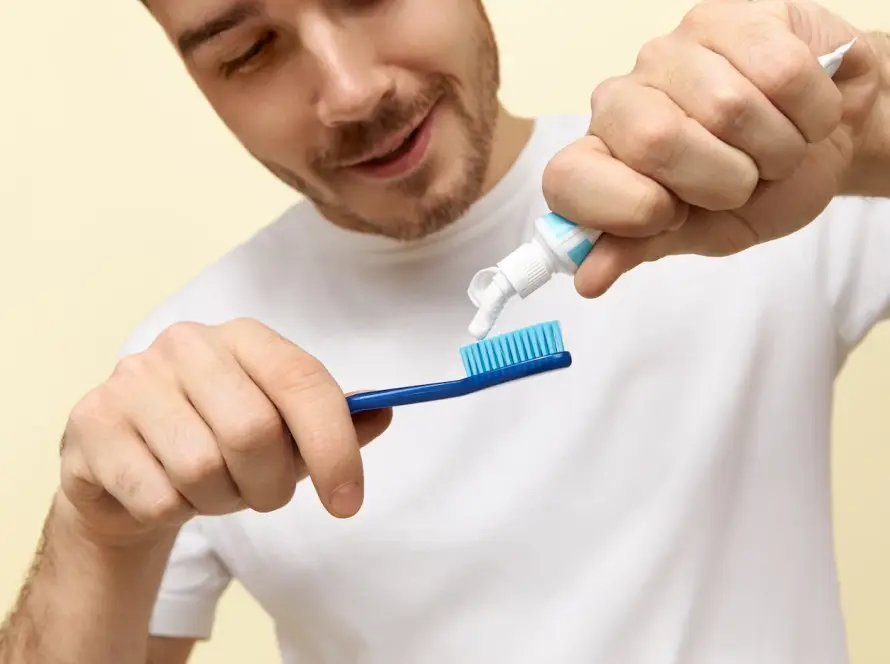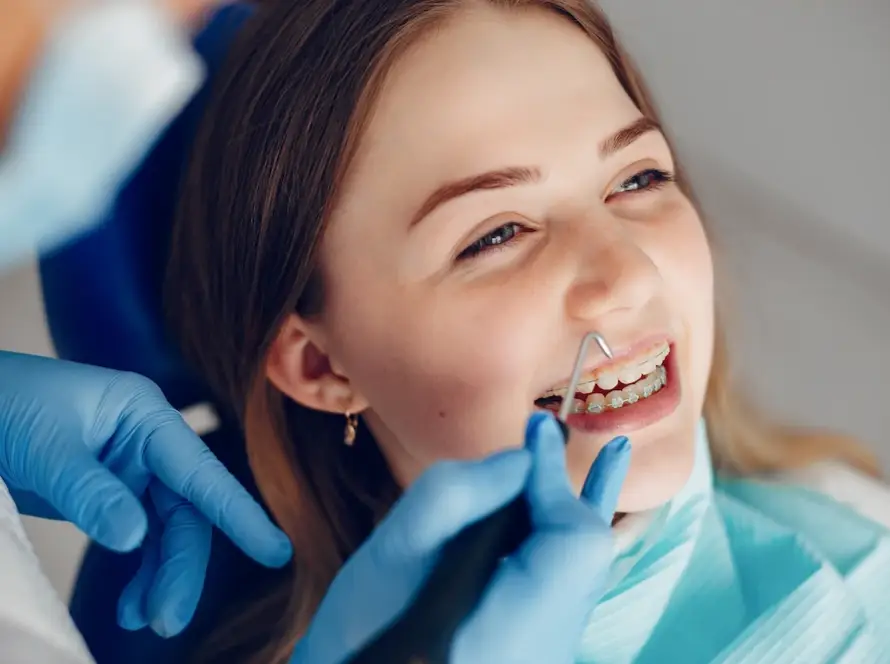A chipped tooth can occur due to a variety of reasons, often resulting from accidental trauma or oral health issues. Here are some common causes of a chipped tooth:
- Accidents or injuries: One of the primary causes of a chipped tooth is accidental trauma. This can happen during sports activities, falls, or automobile accidents. Impact to the mouth can easily cause a tooth to chip or fracture.
- Biting hard objects: Using your teeth as tools or chewing on hard objects can weaken their structure, making them more susceptible to chips. Avoid biting on ice, hard candies, or opening packages with your teeth, as it can lead to chips or cracks.
- Poor oral hygiene: Neglecting regular oral care like brushing, flossing, and dental check ups can lead to weaker teeth. Weakened tooth enamel is more prone to chipping, especially if there are preexisting dental issues like cavities or decay.
- Bruxism: Teeth grinding or clenching, known as bruxism, can place significant pressure on the teeth. Over time, this can lead to chipped or worn down teeth. Stress, anxiety, or misaligned teeth can contribute to bruxism.
- Uneven biting pressure: An imbalanced bite, also called malocclusion, can cause certain teeth to bear more pressure than others. This uneven pressure can eventually result in chips or fractures, particularly if you grind or clench your teeth.
Understanding the underlying causes of a chipped tooth can help you take preventive measures and make informed decisions about treatment options. It is crucial to consult with a dental professional to properly diagnose the cause and determine the most suitable course of action for addressing a chipped tooth.
Chipping a Tooth
When faced with a chipped tooth, it is important to take immediate action to prevent further damage and alleviate any discomfort. Here are some immediate steps you can take:
- Rinse your mouth: Start by rinsing your mouth with warm water to clean the area around the chipped tooth. This will help remove any debris and prevent infection.
- Control bleeding: If the chipped tooth is accompanied by bleeding, apply gentle pressure with a clean piece of gauze or a clean cloth. This will help control the bleeding until further treatment can be administered.
- Reduce swelling: If there is any swelling or pain in the area, apply a cold compress or ice pack on the outside of your mouth. This can help reduce swelling and numb the area, providing temporary relief.
- Take pain relief: Over the counter pain relief medications such as ibuprofen or acetaminophen can be taken to alleviate any discomfort or pain caused by the chipped tooth. However, it is important to consult a dentist before taking any medications, especially if you have any medical conditions or are taking other medications.
- Cover the sharp edges: If the chipped tooth has sharp edges that may cause further injury to your tongue or cheeks, you can use dental wax or sugarless gum to cover them temporarily. This will help prevent any accidental cuts or irritation.
Remember, these immediate steps are only temporary measures. It is crucial to seek professional dental care as soon as possible to prevent any complications and restore your chipped tooth properly.
Dental Treatments for a Chipped Tooth
When dealing with a chipped tooth, there are various dental treatments available to restore both the appearance and functionality of the affected tooth. Here are some common dental treatments for a chipped tooth:
- Dental Bonding: This procedure involves the application of a tooth colored resin material to the chipped area. The resin is then shaped and hardened to match the natural shape of the tooth, providing a seamless appearance. Dental bonding is a relatively quick and cost effective treatment option.
- Dental Veneers: Veneers are thin porcelain shells that are custom made to fit over the front surface of the chipped tooth. They can effectively cover up any imperfections, providing a natural looking result. Veneers are a popular choice for those looking to enhance the appearance of their smile while also addressing a chipped tooth.
- Dental Crowns: A dental crown, also known as a cap, is a tooth shaped restoration that covers the chipped tooth entirely. Crowns are typically made of porcelain, metal, or a combination of both, offering durability and esthetic appeal. This treatment option not only restores the tooth’s appearance but also provides protection and strength.
- Dental Implants: If a chipped tooth is severely damaged or cannot be restored, a dental implant may be considered. An implant involves the placement of a titanium post into the jawbone, acting as an artificial tooth root. A crown is then attached to the implant, creating a natural looking and functional replacement for the chipped tooth.
- Dental Fillings: For minor chips or cracks, dental fillings may be sufficient to restore the tooth. The affected area is cleaned and filled with a tooth colored composite resin, ensuring a strong and seamless result. Dental fillings are an efficient and cost effective solution for smaller chips.
It is essential to consult with a dentist to determine the most suitable treatment option based on the severity of the chipped tooth, its location, and the individual’s specific needs. Dental professionals can provide expert guidance and tailor the treatment plan to achieve optimal results.
The Importance of Taking Care of Your Chipped Tooth
Taking care of a chipped tooth is crucial for a number of reasons.
- Preventing further damage: Ignoring a chipped tooth can lead to more serious dental issues. The jagged edges of a chipped tooth can cause cuts or injuries to the soft tissues in your mouth, such as your tongue or cheeks. Additionally, a chipped tooth is more susceptible to decay and infection if left untreated.
- Preserving your oral health: Maintaining good oral health is essential for overall well being. A chipped tooth not only impacts your smile but can also affect your ability to chew and speak properly. By taking care of your chipped tooth, you promote oral hygiene and ensure the long term health of your teeth and gums.
- Enhancing your appearance: A chipped tooth can be a source of embarrassment and can make you self conscious about your smile. By addressing the issue and seeking appropriate treatment, you can regain your confidence and improve your overall appearance.
- Preventing problems with neighboring teeth: An untreated chipped tooth can cause misalignment or shifting of the surrounding teeth. This can lead to bite problems, jaw pain, and further dental complications. By addressing the chipped tooth promptly, you can avoid these issues and maintain proper dental alignment.
Taking care of your chipped tooth involves seeking professional dental care, practicing proper oral hygiene, and avoiding habits that could further damage the tooth. Remember to consult with a dentist to determine the most appropriate treatment option for your specific situation.
Long Term Solutions For Chipped Teeth
When it comes to addressing chipped teeth, finding long term solutions is crucial for maintaining dental health and aesthetics. Here are some effective options to consider:
- Dental bonding: This procedure involves applying a tooth colored resin to the chipped area, which is then shaped and hardened with a special light. Dental bonding offers a cost effective and non invasive solution for minor chips, restoring both functionality and appearance.
- Dental veneers: Veneers are custom made shells that cover the front surface of chipped teeth. Made from porcelain or composite resin, veneers provide a natural looking, durable solution. They can effectively hide chips and correct other cosmetic imperfections, giving you a confident smile.
- Dental crowns: For more significant chips or structural damage, dental crowns may be necessary. These tooth shaped caps are placed over the damaged tooth, providing strength, protection, and aesthetic enhancement. Crowns are typically made from porcelain or metal alloys, ensuring long lasting results.
- Dental implants: In cases where the chipped tooth cannot be saved, dental implants offer a permanent solution. A titanium implant is surgically placed in the jawbone, serving as an artificial tooth root. A custom made dental crown is then attached to the implant, seamlessly restoring the appearance and function of the missing tooth.
- Orthodontic treatment: If a chipped tooth is a result of misalignment or bite issues, orthodontic treatment may be necessary. Options such as braces or clear aligners can help correct these underlying problems, ensuring a straight and even smile.
Remember, seeking professional advice from a dentist is essential to determine the most appropriate long term solution for your specific case. They will consider various factors such as the extent of the damage, location of the chip, and your overall dental health. By opting for a suitable treatment, you can regain a healthy, restored smile that lasts for years to come.
Preventing Future Tooth Damage
Taking preventive measures can help reduce the risk of future tooth damage and chipping. Here are some tips to keep your teeth healthy and strong:
- Maintain good oral hygiene: Brush your teeth at least twice a day with fluoride toothpaste and floss daily to remove plaque buildup. Proper oral hygiene can help prevent dental issues that can lead to tooth damage.
- Wear a mouthguard: If you participate in contact sports or activities that pose a risk of dental injury, wearing a mouthguard can provide protection. Custom fitted mouthguards offer the best fit and protection.
- Avoid using teeth as tools: Your teeth are designed for biting and chewing food, not for opening packages or cracking nuts. Using your teeth as tools can increase the risk of chipping or cracking.
- Be cautious with hard foods and candies: Chewing on hard foods, such as ice cubes or hard candies, can put excessive pressure on your teeth and lead to chipping. Be mindful of what you eat and avoid biting down on hard substances.
- Regular dental check ups: Visit your dentist regularly for routine check ups and professional cleanings. Regular dental examinations can help identify potential issues before they result in tooth damage.
By following these preventive measures, you can minimize the risk of future tooth damage and keep your smile healthy and intact.
Making an Appointment With a Dentist
When dealing with a chipped tooth, it is imperative to seek professional help as soon as possible. Making an appointment with a dentist is the first step towards finding a solution. Here’s how to go about it:
- Search for a reputable dentist: Start by researching dentists in your area and read reviews or ask for recommendations from family and friends. Look for a dentist who specializes in cosmetic dentistry or restorative procedures, as they will have the expertise to fix a chipped tooth effectively.
- Contact the dental clinic: Once you have identified a potential dentist, give their clinic a call to inquire about their availability and make an appointment. Be prepared to provide details about your chipped tooth and any symptoms you may be experiencing.
- Explain your situation: During the call or at the appointment, clearly explain your situation and the urgency of your condition. If you are in pain or discomfort, make sure to communicate this to the dental staff so they can prioritize your appointment accordingly.
- Schedule an appointment: Work with the dental clinic to find a mutually convenient date and time for your appointment. Be flexible and open to different time slots, especially if you need to be seen urgently.
- Prepare necessary information: Before your appointment, gather any relevant information for the dentist. This may include dental records, x-rays, or any previous treatment history related to your chipped tooth. Providing these details will help the dentist assess your situation more accurately.
- Confirm the appointment: A day or two before the scheduled appointment, make sure to confirm with the dental clinic to avoid any misunderstandings or scheduling conflicts. This will also allow the clinic to notify you of any changes or reminders regarding your visit.
By following these steps, you can ensure a smooth process in making an appointment with a dentist to address your chipped tooth. Remember, prompt professional care is crucial in preventing further damage and finding the most suitable solution for your dental health. Contact us.















